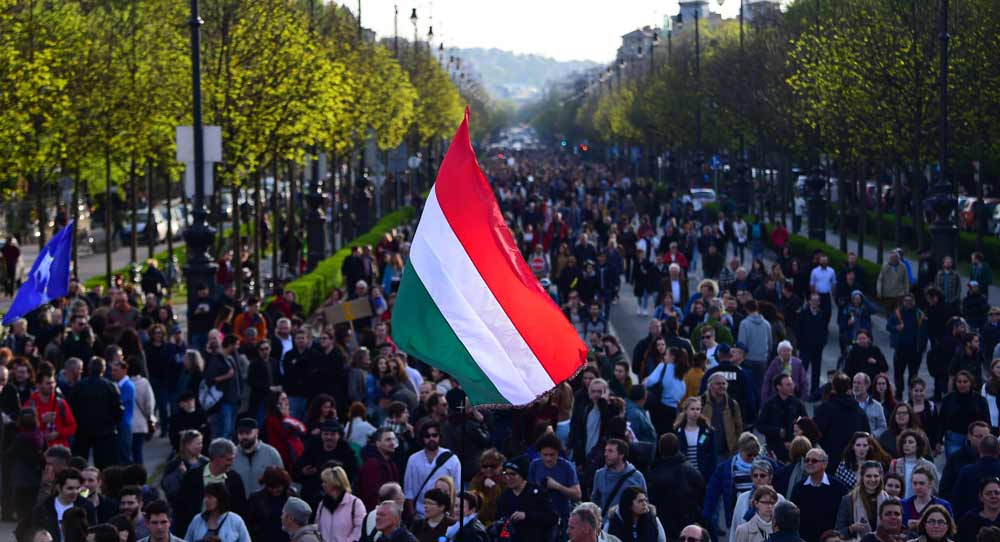It’s the posters vilifying George Soros, the Hungarian-born philanthropist and financier that catch the eye. Every few kilometers along the bus route from the Budapest airport to the city center, there are big billboards warning Hungarians about how Soros wants to swamp the country with refugees and migrants.
This campaign against Soros is linked to the unremitting crackdown on nongovernmental organizations. A new law, passed during the summer by the Hungarian parliament and remarkably similar to Russian legislation, stipulated that any foundation or association that receives any type of foreign funding in excess of €24,000 (or $26,000) must register “as a foreign-supported organization.” What followed was a widespread campaign to discredit opposition politicians and activists with the implication that they posed a national security risk.As if that was not enough, in a televised interview on October 27, Hungarian Prime Minister Viktor Orbán said, “by employing the national security services, the Soros network that strives to influence European life should be exposed.” And, he continued: “Another question is who are these Hungarians who are participating in this process from here, within Hungary?” It almost sounded like a witch hunt. A day earlier, János Lázár, who heads Orbán’s office, said the domestic and foreign security services would monitor these networks.
The Hungarian Helsinki Committee and many other nongovernmental organizations have come under increasing pressure by the government.
During a recent conference in Budapest organized by the Hungarian Europe Society that I was invited to, Màrta Pardavi, the co-chair of the Hungarian Helsinki Committee, gave a detailed and dispassionate account of how the space for independent activities is decreasing. The fourteen-page report makes depressing reading. Pardavi and her colleagues describe what has been taking place in Hungary over the past few years. It should be remembered that attempts to narrow the space for civil society began before the refugee crisis—soon after Orbán was elected in 2010.
In Poland, that space—while still much bigger compared to Hungary—is also being challenged. Similar to Hungary, the independent media and journalists are under pressure. Organizations in Poland that try to protect women against domestic violence have been ransacked by the security services. From November, all Polish nongovernmental organizations will be centrally funded. The implications are clear. They will not be independent. Checks and balances will be weakened. The judiciary has already been reined in.
The Polish economy, similar to Hungary’s, has not been spared. The government in Warsaw has replaced many of the managers of the state-owned enterprises with their own supporters. In Hungary, the economy is mutating toward a mafia state, according to Bálint Magyar, a sociologist, former education minister, and former state secretary for development policy. The scope for systemic corruption has increased.
To protect these spaces, the EU could do much more.
For one thing, OLAF, the European Anti-Fraud Office, could go public in explaining what has happened to the development and structural funds that EU taxpayers have allotted to Hungary. As it is, Hungary ranks third, after Romania and Poland, in the number of investigations about how EU funds are used. But such inquiries depend on the cooperation of local police authorities. And just so that Hungary and Poland will not plead that they are being victimized or singled out by OLAF, the anti-fraud office could be far more outspoken about the misuse of funds in other EU member states.
Second, and again related to the European structural funds that amount to almost 3 percent of gross domestic product for both Hungary and Poland: if the procurement rules lack so much transparency and genuine competitive tenders, why doesn’t the EU suspend the funds? After all, the lack of transparency increases the wealth of Hungary’s oligarchs.
Third, civil society spaces need independent, nonpartisan information. If the EU believes in what it preaches about a free and independent media, then it should channel funds to outlets that will give viewers and listeners not an alternative view as such but information based on facts. No doubt Budapest and Warsaw would balk at this by claiming that the EU is interfering, to quote an old communist slogan, “in the internal affairs of another country.”
Fourth, the European People’s Party that groups together the conservative political parties throughout the EU should suspend Fidesz’s membership. It is true that several EU member states support Orbán’s anti-refugee stance. But that is not the real issue. The real issue is about how Orbán and his governing party are eroding democracy in order to remain in power. Poland’s Law and Justice party, led by Jarosław Kaczyński, is pursuing the same goal. If they succeed, the EU may as well wash its hands of its values.








.jpg)